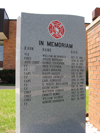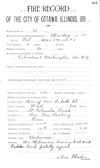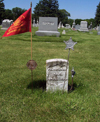Firefighter Record
Firefighter Details
| Name | William McNamara |
| Agency | Ottawa Fire Department |
| Rank | Firefighter |
| Type of Firefighter | [Unknown] |
| Age Range | 61 to 70 |
| Sex | Male |
| Date of Birth | 4/6/1845 |
| Date of Death | 10/15/1906 |
| Cause of Death | Thrown from vehicle |
| Nature of Death | Trauma |
| Attribute of Death | [not applicable] |
| Type of Duty | Responding to/returning from incident |
Incident Details
| Incident Name | N/A |
| Incident City | Ottawa |
| Incident State | IL |
| Incident Date | 10/15/1906 19:45 |
| Incident Location | Street/Road |
| Incident Attribute | Traffic accidents |
Incident Summary
William McNamara was born on April 6, 1845, in Cork, Ireland, as the oldest of five children. In 1851, he moved to Boston with his mother, joining his father who had preceded them to the United States. The family moved to Ottawa, Illinois, in 1859. McNamara worked on farms and in mines as a teenager, and in 1862 attempted to join the 104th Illinois Volunteer Infantry to fight in the Civil War. McNamara fell in with Company D and was with the unit for some expeditions in Kentucky, but the mustering officer refused to enlist him because of his young age and he was forced to return home to Ottawa. McNamara officially enlisted in Company E, 64th Illinois Volunteer Infantry on February 27, 1864, joining the regiment in Decatur, Alabama, in March. The 64th Regiment saw a great deal of action, and participated in the Battles of Resaleo, Dallas, Kenesaw Mountain, Atlanta, Snake Creek Gap, all in Georgia, and also fought in Bentonville, Georgia. Following the war, the 64th Regiment was part of the Grand Review of the Armies held in Washington, D.C., during May 1865, and McNamara was discharged in Chicago on July 11, 1865.
McNamara returned to Ottawa and married Nora Donoghue on January 12, 1868. They had seven children, but during the epidemical scourge of dipthiria in Streator in 1885, five of their children died over the course of a single week. In 1869, McNamara moved to New Orleans where he served as a police officer from 1871 to 1873. During those years, New Orleans was the scene of violent unrest and racial tension, and policemen were active as soldiers of war. In 1873, McNamara joined the United States Navy and served for eleven months, before returning to Illinois and moving to Streator in 1874. McNamara served many years with the 4th Regiment of the Illinois National Guard, and was a charter member of Streator Post #68 of the Grand Army of the Republic, a Civil War veteran’s organization.
McNamara died in the line of duty as a member of the Ottawa Fire Department in 1906. As patrol wagon driver, McNamara was responsible for hitching the patrol team of horses to the hook and ladder truck, and his truck usually followed the hose cart, which was first out and was pulled by the fire team. The hook and ladder truck he drove was purchased from Peter Pirsh and Sons in 1905, and was the first of four ladder trucks built by the firm for the Ottawa Fire Department during the twentieth century, the last of which was retired in October 1996.
On October 15, 1906, a fire alarm was turned in at around 7:45 PM for a barn fire between LaSalle and Columbus Streets in Ottawa. McNamara hitched his team to the hook and ladder truck, and exited the fire station onto Clinton Street, with four firefighters standing on the left footboard of the truck. McNamara wheeled his team north to LaFayette Street and then eastbound at a high rate of speed. As the truck approached LaSalle Street, McNamara pulled the team to the south to make a wide swing northbound onto LaSalle, but the truck wheels caught on the streetcar tracks of the Northern Illinois Light and Traction Company. A quick swerve threw the truck to one side, but it righted with a jerk, unseating McNamara and throwing him to the street.
The heavy vehicle (nearly two tons) passed over McNamara’s body and inflicted serious injuries. The remaining firefighters jumped from the truck, and three attended to McNamara while the fourth retrieved the horse team and truck, which had continued at full speed to the end of LaFayette Street. McNamara was transported four blocks to Ryburn Hospital where he was treated for punctured lungs and broken ribs, but he died thirty minutes later.
The coroner held an inquest over his remains on October 16, and funeral services were held on October 18 at St. Patrick’s Church. The services were attended by the mayor, members of city government, and the fire and police departments wore dress uniforms. Reverend M. A. Quirk spoke of the dangers McNamara encountered as a soldier and firefighter and of his record as a citizen. McNamara was interred at St. Columba Cemetery, where Seth C. Earl from the Grand Army of the Republic post officiated. McNamara was survived by his wife of thirty-eight years and a sixteen year old daughter named Gertrude. He was described as a good officer and citizen, and a strong and robust man who was always pleasant, cheerful, and who always looked to the sunny side of life.
Summary provided by Steve Schaibley and Gary Fogarty of the Ottawa Fire Department.



